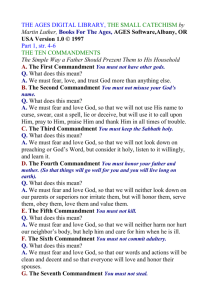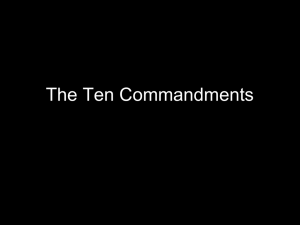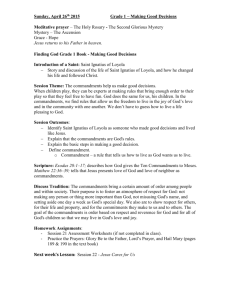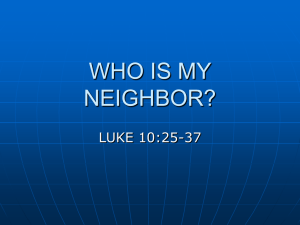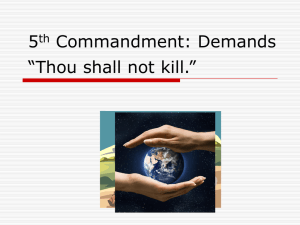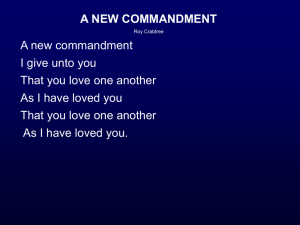October 10/11
advertisement
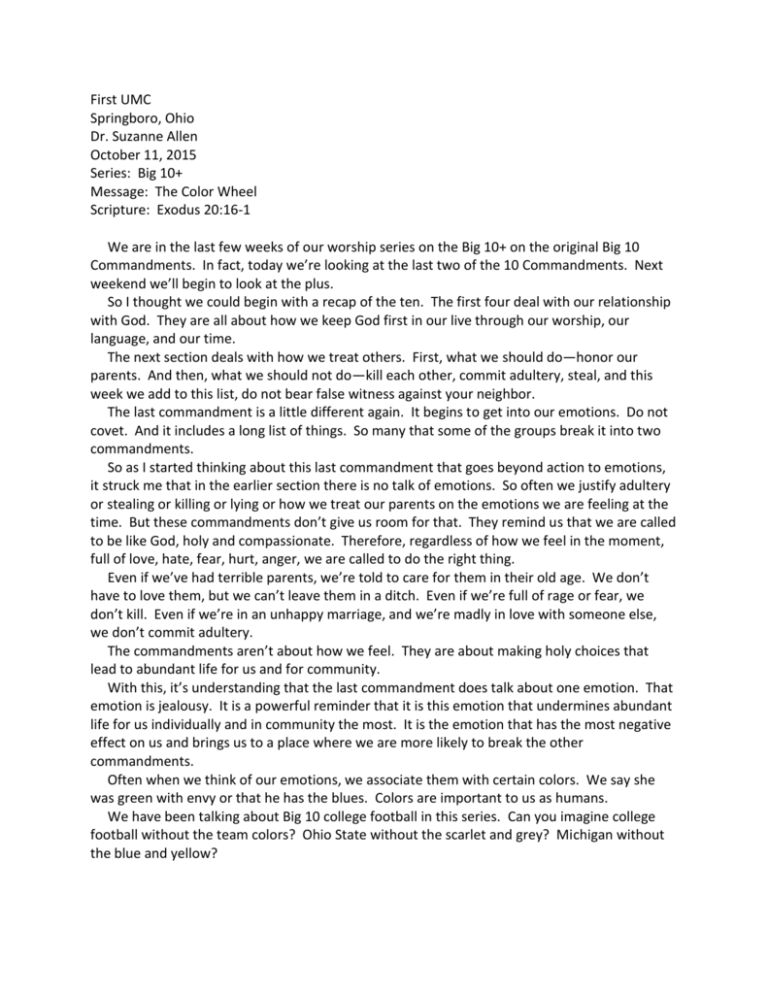
First UMC Springboro, Ohio Dr. Suzanne Allen October 11, 2015 Series: Big 10+ Message: The Color Wheel Scripture: Exodus 20:16-1 We are in the last few weeks of our worship series on the Big 10+ on the original Big 10 Commandments. In fact, today we’re looking at the last two of the 10 Commandments. Next weekend we’ll begin to look at the plus. So I thought we could begin with a recap of the ten. The first four deal with our relationship with God. They are all about how we keep God first in our live through our worship, our language, and our time. The next section deals with how we treat others. First, what we should do—honor our parents. And then, what we should not do—kill each other, commit adultery, steal, and this week we add to this list, do not bear false witness against your neighbor. The last commandment is a little different again. It begins to get into our emotions. Do not covet. And it includes a long list of things. So many that some of the groups break it into two commandments. So as I started thinking about this last commandment that goes beyond action to emotions, it struck me that in the earlier section there is no talk of emotions. So often we justify adultery or stealing or killing or lying or how we treat our parents on the emotions we are feeling at the time. But these commandments don’t give us room for that. They remind us that we are called to be like God, holy and compassionate. Therefore, regardless of how we feel in the moment, full of love, hate, fear, hurt, anger, we are called to do the right thing. Even if we’ve had terrible parents, we’re told to care for them in their old age. We don’t have to love them, but we can’t leave them in a ditch. Even if we’re full of rage or fear, we don’t kill. Even if we’re in an unhappy marriage, and we’re madly in love with someone else, we don’t commit adultery. The commandments aren’t about how we feel. They are about making holy choices that lead to abundant life for us and for community. With this, it’s understanding that the last commandment does talk about one emotion. That emotion is jealousy. It is a powerful reminder that it is this emotion that undermines abundant life for us individually and in community the most. It is the emotion that has the most negative effect on us and brings us to a place where we are more likely to break the other commandments. Often when we think of our emotions, we associate them with certain colors. We say she was green with envy or that he has the blues. Colors are important to us as humans. We have been talking about Big 10 college football in this series. Can you imagine college football without the team colors? Ohio State without the scarlet and grey? Michigan without the blue and yellow? The team colors create unity. They identify you. They are contagious. I always laugh at Christmas in Springboro with all the people wearing red, not for Christmas, but to support their Buckeyes. Beyond supporting our favorite sports teams, we choose colors to wear that represent the season, or to reflect our mood. Often we do it without thinking much about it. Some days we’re feeling bright and cheerful, others, dark or more subdued. I’m always amazed how often people, without any planning, will show up wearing the same colors. It reminds me that we are interconnected emotionally in ways we hardly realize. Disney’s Pixar Studio picked up on the theme of representing emotions with colors in their recent movie “Inside Out.” Some of the main characters in the movie are the emotions inside 11 year old Riley’s head. They each have their own color—blue for sadness, yellow/gold for joy, purple for fear, green for disgust, and red for anger. All of this got me thinking about the 10 Commandments and what it would be like to assign colors to each commandment. Some were pretty easy, red for do not kill, gold and white and yellow for the ones about God, purple for stealing and adultery. Blue for your parents. This weeks was particularly easy for both commandments, bearing false witness and coveting—green—the traditional color for envy and jealousy. So let’s look a little bit more at these last two commandments: “Do not bear false witness against your neighbor” and “Do not covet…” Sometimes the first commandment is simplified to “do not lie.” I’m all for telling the truth and living in the truth. There’s a whole lot we could talk about just in that. But like last week, when we put these commandments together, they push us to go deeper, to push past what we assume that we know. When I put these two side by side this week, what stood out was the neighbor. Don’t lie about your neighbor. Don’t be jealous of your neighbor—of their stuff, their family, their wife, their life. Neighbor is more than your next door neighbor. In the Bible, neighbor is anyone who crosses your path, anyone who is God’s child. So in this 9th commandment we are instructed to tell the truth about our neighbor—God’s truth that is—regardless of how we feel about that neighbor. Our words have the power, an incredible power, to influence reality. And too often our words are influenced by our feelings. We don’t care for our neighbors or we are jealous of them or we don’t think they like us. When this happens we say things to portray them in a negative light, to undermine their credibility. Or maybe we want to keep the peace in the neighborhood so we say nice things to keep the peace and avoid confrontation even through the truth needs to be addressed for everyone’s good. Usually when we bear false witness against our neighbor, it’s as much or more about us than them. We have anger or jealousy in our hearts. We’re trying to undermine them or get something for ourselves. Joan Chittister puts it this way, “When we lie about the other, it is the sign that there is something we do not like about ourselves. Something’s missing. Something isn’t right.” And whatever isn’t right usually makes us hard on ourselves, insecure, always comparing ourselves to others. Not seeing God’s truth, but a warped truth where we are in competition with our neighbor. And as we compete, we compare. And whether it is true or not, the grass always seems to be greener on the other side. We can’t see the blessings and gifts we have because we’re so busy looking at what others have. We end up with the spiritual disease of “perpetual dissatisfaction.” (Chittister) It’s never good enough. This is why we need this final commandment. It’s the emotional center of why we end up breaking the other commandments: envy. These emotions cause us to live in perpetual criticism and dissatisfaction that lead to despair. There is never enough. It’s never good enough. The spiritual antidote is “do not covet.” Do not desire anything your neighbor or anyone else has. Only desire God. And when you only desire God, you will find God, and you will find that God is enough. God is the only thing that is enough to fill that gaping hole of desire and wanting within us. We find truth in God. We stop living in the lies that lead to despair. We find the freedom to accept ourselves, who we are in the truth of who God accepts us as. We find the freedom to be ourselves, full of life, full of peace, full of God. And when we know that God accepts us and when we accept ourselves, then our relationship with others, our neighbors change. We are not envious of them, but glad for them when life is good, worried for them when life is not. When we find the truth of our identity in God through the grace of Jesus, we move around the color wheel, the commandment wheel, from being green with envy and despair to the gold of worshiping God and living his truth, which is joy and peace.
